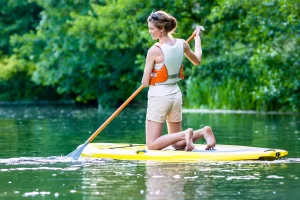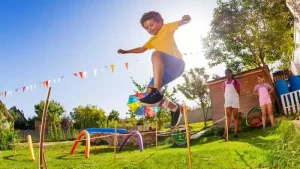Children develop teamwork and camaraderie through outdoor play, which is especially memorable in childhood. In the digital age, children’s physical and social development is increasingly dependent on outdoor activities, as they are often addicted to screens. Involving children in exciting outdoor games is one way to promote their cooperation.
Tug of war: building cohesion and strength
Tug of war is an eternal outdoor activity that not only trains children’s physical strength, but also promotes children’s cooperation and unity. By dividing them into two teams, each working in a different way, you teach them the value of working together to achieve a common goal.
Capture the Flag: collaboration and strategy
A cooperative outdoor game called Capture the Flag promotes teamwork. The participants are divided into two teams, where each team’s goal is to defend their own flag while capturing their opponent’s flag. Playing this game encourages participants to communicate, collaborate and think strategically.
Three-legged race: promoting interaction
The three-legged race is a fun and useful team-building activity where young people, tied in pairs at the ankles, must work together to cross the finish line. By playing this game with colleagues, they can better communicate, coordinate and encourage each other.
Obstacle course: working together to overcome difficulties
Obstacle Course is a fast-paced outdoor game in which participants must work together to overcome obstacles such as crawling, jumping and climbing. When children work together on challenges, their relationships are strengthened because it encourages collaboration and problem solving.
Relay racing: improving synchronization and cooperation
Teams hold relay races by passing the baton from one colleague to another. Playing this fast-paced outdoor game improves coordination, speed and teamwork as players race to be the first to complete the relay.
Cuju: a fun collaborative activity
Like baseball, kickball is a fun and inclusive outdoor activity played by kicking a rubber ball instead of hitting it with a bat. Cuqiu is a cooperative team sport designed to promote cooperation between players to score and catch the opponent’s kick.
Balloon Popping: Develop coordination and quick thinking
In the exciting outdoor game Balloon Pop, teams compete to pop balloons tied to their opponents’ ankles while avoiding their own ankles. Players must coordinate their quick thinking, flexibility and cooperation to defend their own balloons while targeting their opponent’s balloons.
Red Rover: building communication and trust
The traditional Red Rover offside game requires trust, strategy and cooperation. One team requires a player from the other team to break the connected arms and form two lines opposite each other. Playing this game with a team promotes trust, cooperation and communication.
Scavenger Hunt: Collaboration and Problem Solving
Scavenger hunts are exciting outdoor activities that promote collaboration, problem solving and teamwork. To solve puzzles, find hidden objects and overcome obstacles, children work in groups to develop collaboration and communication skills.
How to plan outdoor sports successfully
Organizing outdoor activities for kids requires careful planning and preparation to ensure everyone has a great time. The following tips can help you plan outdoor play effectively:
Prepare in advance: Choose appropriate games based on your child’s age and interests.
Form teams: Divide children into teams of equal size and make sure each team has different ages and skill levels.
Arrange the play space: Define the boundaries and arrange the props or equipment needed to play.
Identify safety measures: Before the game starts, you should conduct a safety briefing outlining the rules to be followed and any hazards.
Encouragement and assistance: Emphasize the value of sportsmanship and teamwork, and encourage children to encourage and support their teammates.
Some suggestions to promote cooperation in outdoor sports
Practicing outdoor sports that involve team dynamics is essential to helping children learn cooperation and teamwork. When playing outdoors, consider the following strategies to encourage teamwork:
A strong focus on communication: Teach children to talk to each other and work together to achieve common goals.
Rotate roles: Give children different roles to play each game so they can learn the ropes
The levels are lowered so that everyone can join in and support the team.
In brief
Outdoor play can greatly improve children’s social skills, cooperation skills and team spirit. In addition to developing physical strength and coordination, children acquire important skills in communication, teamwork and sportsmanship while participating in fun and participatory outdoor activities. Children can connect with classmates, gain self-confidence and acquire important life skills that will help them on and off the playground by planning and participating in outdoor activities.
Professional FAQs
Can children’s social skills be improved by playing outdoor games?
Yes, playing outdoor games can promote the development of social skills by promoting teamwork, interaction and communication.
Can children of all ages play outdoor games?
Yes, there are outdoor activities and sports activities of different levels that are suitable for children of all ages, from toddlers to teenagers.
How can parents encourage their children to play games outside?
Parents can set a good example for their children by participating in outdoor activities themselves and providing their children with a safe and stimulating atmosphere to play outside.
What safety measures should you take into account when planning an outdoor event?
Setting clear boundaries, making sure equipment is working properly, providing adequate supervision and educating children about potential risks are all examples of safety measures.



